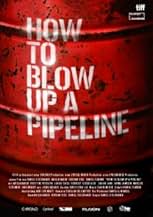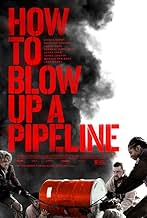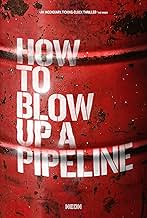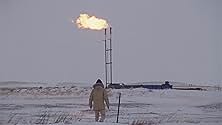IMDb रेटिंग
6.9/10
12 हज़ार
आपकी रेटिंग
अपनी भाषा में प्लॉट जोड़ेंA crew of environmental activists plot a daring plan to disrupt an oil pipeline.A crew of environmental activists plot a daring plan to disrupt an oil pipeline.A crew of environmental activists plot a daring plan to disrupt an oil pipeline.
- पुरस्कार
- 5 जीत और कुल 16 नामांकन
फ़ीचर्ड समीक्षाएं
Up until this film I had never heard of the book How to Blow Up a Pipeline nor of it's author, Andreas Malm but this Swedish writer and associate professor has been preaching the 'joys' of environmentalists taking direct action to property for awhile. Is this fictional depiction of his writing a good summary of Malm's thoughts? It would appear so.
Of course, that doesn't make the movie good. What does make it worth a watch is how the planning and execution of this act of violence (or self defense) is portrayed. The director, Daniel Goldhaber, has given us a very decent thriller. Yes, the characters are not terribly deep but if you enjoy watching smart people figure out a heist, well in this case an explosion, then this is the film for you. Also, to have a film made in America that is basically pro-terror attack 22 years after 9/11 makes for fascinating viewing. Who would have ever guessed this day would ever come?
Should this film get any push back I have no doubt you'll hear some denounce the picture by saying brute force is not the answer. The problem with that argument is that cinema has been celebrating violence against people (See any action movie, cop film or western) for years so why not one about violence against oil pipelines?
Of course, that doesn't make the movie good. What does make it worth a watch is how the planning and execution of this act of violence (or self defense) is portrayed. The director, Daniel Goldhaber, has given us a very decent thriller. Yes, the characters are not terribly deep but if you enjoy watching smart people figure out a heist, well in this case an explosion, then this is the film for you. Also, to have a film made in America that is basically pro-terror attack 22 years after 9/11 makes for fascinating viewing. Who would have ever guessed this day would ever come?
Should this film get any push back I have no doubt you'll hear some denounce the picture by saying brute force is not the answer. The problem with that argument is that cinema has been celebrating violence against people (See any action movie, cop film or western) for years so why not one about violence against oil pipelines?
When I read about "How to Blow Up a Pipeline", I just had to see this movie. It is a timely political thriller that follows a group of eco-saboteurs who target an oil pipeline. Led by Xochitl, played by Ariela Barer, the group includes a diverse mix of characters, each with their own reasons for taking drastic action against the things that are killing the planet. The movie intercuts between their operation in Texas and flashbacks that reveal each character's motivations. We follow the group's nerve-wracking operation in Texas, where they check out their target, rig up explosives, and then set about doing the deed. Despite its political leanings, the movie doesn't preach or glamorize its characters, and the actors deliver strong performances that bring the characters to life. A very enjoyable movie to watch.
I did enjoy 'How to Blow Up a Pipeline', but I couldn't help but want to rewatch 'The East' (dir Batmanglij, 2013), which had a similar structure (re denouement), but the stakes seemed higher in 'The East', and the psychology of the characters were a lot more deep and varied. I think that was because you come at 'The East' from the point of view of an outsider, and you watch her character arc alongside that of the eco-terrorists, and see how interacting with them changes her (and changes you, as a viewer, too).
But, even so, I'm very glad I did watch 'How to Blow Up a Pipeline', and the film made me want to read the source material.
But, even so, I'm very glad I did watch 'How to Blow Up a Pipeline', and the film made me want to read the source material.
Recently, when a bunch of "Just Stop Oil" activists disturbed a World Snooker Championship game and, as per Gen-Z-climate-activist tradition, threw food all over the tables and sat themselves down in their anti-oil garments, a Twitter user quipped: "These types of climate protests are so detrimental to raising actual awareness and widespread support that if it ever came out that these people were paid for by gas and coal-owning billionaires I'd probably believe it".
Now, I don't know if the companies behind the well-made but questionable How to Blow Up a Pipeline have any such dubious ties (neither the production companies nor the distributor, Neon, have any deals with Big Oil that I could find). But man, what a time to do a psyop to make the enemy look deranged when said enemy will agree with the assessment and be proud of it!
Here is a movie loosely based on a book -- whose name-similarity to some kinda Dark Web instruction manual isn't accidental -- that speaks straight-out about how violence is a necessity for "climate justice"; essentially how destruction is correct so long as it's (purportedly) in the name of the right cause. I guess I shouldn't be too shocked. It was racism in 2020, it's climate change now; I just thought it was gonna be less mask-off terror apologia and more trying to rationalize throwing soup at art to make fossil fuels go away.
Then again, the book predates all those incidents and this manner of disruption was fairly commonplace in Sweden, the author's homeland, before the big vandalism stories of recent UK and US news. Perhaps the real surprise is that it came out after the Nord Stream incident -- an as-yet-unresolved case (of POSSIBLE eco-terrorism) that damaged decidedly more than "replaceable property" (what many radicals will tell you is the only real victim, even on a bad day). Not that this ever really stopped at "property", especially among the new wave of post-Thunberg soup Zoomers.
I sometimes ask: If, for example, a patient dies inside an ambulance as a result of road-blocking climate protestors -- as has literally happened in, you guessed it, Sweden a few months ago -- is that person deemed a necessary sacrifice for the utopia? After all, what's one death vs. The doomsday you've been told you're preventing? Do you redirect the trolley to kill one human when there are 8 billion hypothetical humans on the other track?
I accuse people of pussyfooting around this query, but I realize they've been answering me through actions for some time. When activists were convicted for the incident in Sweden, there were additional manifestations -- not in the name of the person that died, but the ones that got arrested.
Will a film like this exacerbate things? Hopefully not. It's being praised by the Usual Journalists for portraying the "terrorists" (sometimes in quotes, sometimes not) in a sympathetic light, but I didn't read them as outright unblemished. Someone will go "This was my Joker" but someone always does.
Now, I don't know if the companies behind the well-made but questionable How to Blow Up a Pipeline have any such dubious ties (neither the production companies nor the distributor, Neon, have any deals with Big Oil that I could find). But man, what a time to do a psyop to make the enemy look deranged when said enemy will agree with the assessment and be proud of it!
Here is a movie loosely based on a book -- whose name-similarity to some kinda Dark Web instruction manual isn't accidental -- that speaks straight-out about how violence is a necessity for "climate justice"; essentially how destruction is correct so long as it's (purportedly) in the name of the right cause. I guess I shouldn't be too shocked. It was racism in 2020, it's climate change now; I just thought it was gonna be less mask-off terror apologia and more trying to rationalize throwing soup at art to make fossil fuels go away.
Then again, the book predates all those incidents and this manner of disruption was fairly commonplace in Sweden, the author's homeland, before the big vandalism stories of recent UK and US news. Perhaps the real surprise is that it came out after the Nord Stream incident -- an as-yet-unresolved case (of POSSIBLE eco-terrorism) that damaged decidedly more than "replaceable property" (what many radicals will tell you is the only real victim, even on a bad day). Not that this ever really stopped at "property", especially among the new wave of post-Thunberg soup Zoomers.
I sometimes ask: If, for example, a patient dies inside an ambulance as a result of road-blocking climate protestors -- as has literally happened in, you guessed it, Sweden a few months ago -- is that person deemed a necessary sacrifice for the utopia? After all, what's one death vs. The doomsday you've been told you're preventing? Do you redirect the trolley to kill one human when there are 8 billion hypothetical humans on the other track?
I accuse people of pussyfooting around this query, but I realize they've been answering me through actions for some time. When activists were convicted for the incident in Sweden, there were additional manifestations -- not in the name of the person that died, but the ones that got arrested.
Will a film like this exacerbate things? Hopefully not. It's being praised by the Usual Journalists for portraying the "terrorists" (sometimes in quotes, sometimes not) in a sympathetic light, but I didn't read them as outright unblemished. Someone will go "This was my Joker" but someone always does.
How To Blow Up A Pipeline is sold as a crackling environmental thriller with a message. The fact that it presents the message it has with a hammer doesn't hide the fact that as a film it is just shallow. It is exactly what the title says. It's about a group of climate change activists that plan and carry out the disabling of an oil pipeline in Texas. The problem is that the characters are paper thin. They are just a collection of grievances and slogans, not three dimensional people. I have watched many films like this where I may not agree with the cause or politics of the characters but at least in better movies of this kind I can relate or at least empathize with at least one or some of them. Even though this film uses flashbacks to set up the characters you don't get to know any of them. Those scenes are used to set up and justify their actions which we know is the blowing up of the pipeline. There is no suspense because I didn't care for characters. They are just stereotypes as opposed to fleshed out characters. Each character seems like a bumper sticker representing a particular grievance. This film wants the audience to think about how deep the message is but fails to create compelling characters to support the ambitions of their message.
The film is well made but is content with not really delving into the subject it wants to represent. The filmmakers sabotage their own message by being so superficial.
Grade: C-
The film is well made but is content with not really delving into the subject it wants to represent. The filmmakers sabotage their own message by being so superficial.
Grade: C-
क्या आपको पता है
- ट्रिवियाMalm's book (How to Blow Up a Pipeline) is a work of nonfiction that uses a history of social justice movements to argue that property destruction should be considered a valid tactic in the pursuit of environmental justice.
- कनेक्शनFeatures Spy x Family (2022)
- साउंडट्रैकChamomile
Written, Performed, and Produced by Cameron Burt (as Winslow Leach)
टॉप पसंद
रेटिंग देने के लिए साइन-इन करें और वैयक्तिकृत सुझावों के लिए वॉचलिस्ट करें
- How long is How to Blow Up a Pipeline?Alexa द्वारा संचालित
विवरण
- रिलीज़ की तारीख़
- कंट्री ऑफ़ ओरिजिन
- आधिकारिक साइट
- भाषा
- इस रूप में भी जाना जाता है
- How to Blow Up A Pipeline
- फ़िल्माने की जगहें
- उत्पादन कंपनियां
- IMDbPro पर और कंपनी क्रेडिट देखें
बॉक्स ऑफ़िस
- US और कनाडा में सकल
- $7,50,010
- US और कनाडा में पहले सप्ताह में कुल कमाई
- $1,15,453
- 9 अप्रैल 2023
- दुनिया भर में सकल
- $10,46,811
- चलने की अवधि1 घंटा 44 मिनट
- रंग
- पक्ष अनुपात
- 1.78 : 1
इस पेज में योगदान दें
किसी बदलाव का सुझाव दें या अनुपलब्ध कॉन्टेंट जोड़ें








































